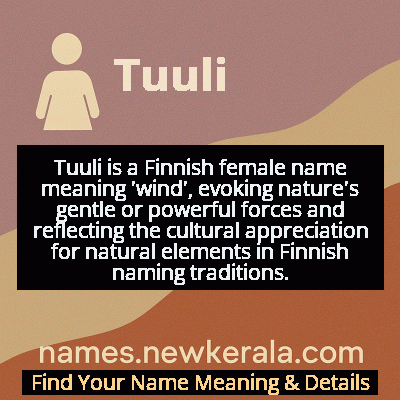Tuuli Name Meaning & Details
Origin, Popularity, Numerology Analysis & Name Meaning of Tuuli
Discover the origin, meaning, and cultural significance of the name TUULI. Delve into its historical roots and explore the lasting impact it has had on communities and traditions.
Name
Tuuli
Gender
Female
Origin
Finnish
Lucky Number
2
Meaning of the Name - Tuuli
Tuuli is a Finnish female name meaning 'wind', evoking nature's gentle or powerful forces and reflecting the cultural appreciation for natural elements in Finnish naming traditions.
Tuuli - Complete Numerology Analysis
Your Numerology Number
Based on Pythagorean Numerology System
Ruling Planet
Moon
Positive Nature
Diplomatic, friendly, artistic, empathetic.
Negative Traits
Over-sensitive, moody, indecisive, prone to self-pity.
Lucky Colours
Green, cream, white.
Lucky Days
Monday.
Lucky Stones
Pearl, moonstone.
Harmony Numbers
1, 3, 4.
Best Suited Professions
Diplomats, mediators, caregivers, artists.
What People Like About You
Cooperative spirit, friendliness, artistic talent.
Famous People Named Tuuli
Tuuli Petäjä
Olympic sailor
Silver medalist in windsurfing at 2012 London Olympics
Tuuli Mattelmäki
Design researcher
Professor of design at Aalto University, pioneering work in co-design and service design
Tuuli Narkle
Actress
Australian actress known for roles in 'The Heights' and 'Mystery Road'
Tuuli Roosma
Musician
Estonian singer and songwriter, member of popular band Traffic
Name Variations & International Equivalents
Click on blue names to explore their detailed meanings. Gray names with will be available soon.
Cultural & Historical Significance
The wind specifically symbolizes change, freedom, and the unseen forces that influence daily life, making Tuuli a name that carries both poetic and practical significance in Finnish heritage. In Kalevala, the Finnish national epic, natural elements like wind play crucial roles in creation stories and heroic tales. The name also reflects Finland's geographical identity as a land of lakes and forests where weather patterns significantly impact daily life and seasonal activities. This connection to nature remains strong in modern Finnish culture, where environmental awareness and appreciation for natural beauty continue to shape national identity.
Extended Personality Analysis
Individuals named Tuuli are often perceived as free-spirited, energetic, and adaptable, much like the wind their name represents. They typically exhibit qualities of independence and creativity, with a natural ability to navigate changing circumstances. Their personality often combines intellectual curiosity with emotional depth, making them both thoughtful and spontaneous. Tuulis are frequently described as having a refreshing presence - they can be gentle and calming like a summer breeze or powerful and transformative like a storm.
These individuals tend to be excellent communicators who can influence others while maintaining their own strong sense of identity. This combination of traits often makes them natural leaders who inspire change and innovation in their communities. They're known for their ability to 'read the room' and adjust their approach accordingly, much like wind changing direction. While they value their freedom and independence, Tuulis also demonstrate remarkable loyalty to those they care about. Their dynamic nature means they're rarely stagnant - always seeking new experiences, knowledge, and opportunities for personal growth. This makes them exciting companions and valuable friends who bring energy and fresh perspectives to any situation.
Modern Usage & Popularity
In contemporary Finland, Tuuli remains a popular and well-loved name that has maintained consistent usage without becoming overly common. According to Finnish Population Register Centre statistics, Tuuli has ranked between 50th and 100th in popularity for girls' names over the past two decades. The name enjoys particular favor among urban, educated families who appreciate its natural origins and melodic sound. Internationally, Tuuli has gained some recognition through Finnish cultural exports and diaspora communities, though it remains distinctly Finnish in character. The name's appeal lies in its perfect balance of tradition and modernity - it feels both timeless and contemporary, making it an excellent choice for parents seeking a name with cultural roots that doesn't sound dated. Recent trends show increased interest in nature-based names globally, which has helped maintain Tuuli's relevance and appeal beyond Finnish borders.
Symbolic & Spiritual Meanings
Symbolically, Tuuli represents movement, change, and the invisible forces that shape our world. Like the wind, it symbolizes freedom and the inability to be contained or restricted. In metaphorical terms, Tuuli embodies the concept of breath and life force - the essential element that connects all living things. The wind carries seeds to new ground, whispers secrets across distances, and cleanses the air we breathe, making Tuuli a name that symbolizes renewal and communication. It represents both gentle guidance and powerful transformation, reflecting how wind can either caress or reshape the landscape. This duality makes Tuuli a name rich with symbolic potential, suggesting a personality that can adapt to circumstances while maintaining core strength and purpose. In many cultures, wind represents the spirit or soul, and names derived from wind often carry connotations of divine inspiration, creativity, and the connection between earthly and spiritual realms.

